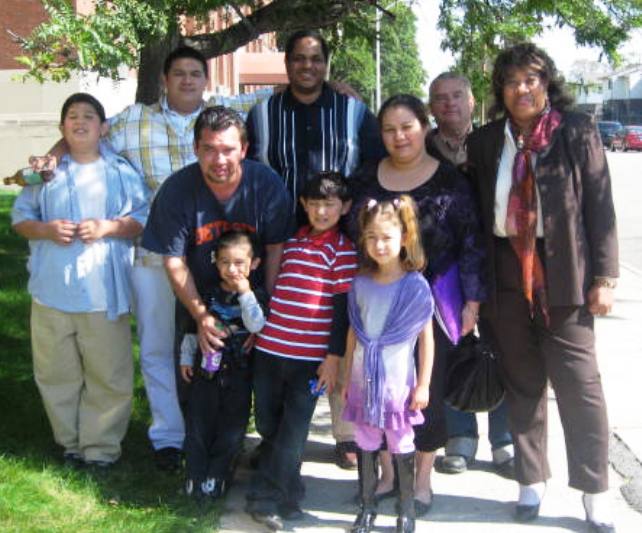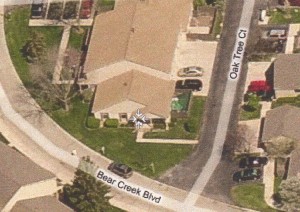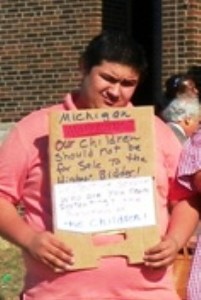
Espinoza family and friends reunited for a short time Sept. 27: (l to r rear) Pedro, Luis Jr , Cornell Squires, Oscar Gutierrez, Mabel Love; (l to r front). Luis Sr. holding Leonardo, mother Cecilia with Genoveva in front of her
Espinoza children at Family Court Sept. 27 as custody trial begins
By Diane Bukowski
Oct. 3, 2011
DETROIT – The five children of Luis and Cecilia Espinoza of southwest Detroit were very happy to finally see their mother again in Wayne County Family Court Sept. 27. They have only been able to see her one hour a week, pending the results of a trial on a petition for temporary custody that began that day before Referee Charles Wilson.
Three of the children, including Genoveva, 6, told Children’s Law Attorney Frederick Smith before the hearing, “I want my mother to come home.” Smith is the court-appointed Guardian ad Litem for Genoveva.
Genoveva, in a pretty lavender dress, shyly hugged her mother. Leonardo appeared relieved, and ran around joyously after the hearing. He thought his mother was not coming home because she did not love him anymore, according to family friend Cornell Squires.
Family friends Oscar Gutierrez, Mabel Love, and Cornell Squires were there to lend their love and support.
“It is not right what they are doing to this family,” Gutierrez said. “I’ve known them for many years, and they have been together for too long to be broken up like this. Genoveva especially needs her mother. She is getting older, and there are no other girls or women in the home.”

Consuelo Meade, 83, lives in this luxury condominium in Warren while the Espinoza family lives in a poor neighborhood in southwest Detroit
Consuelo Meade, Cecilia’s adoptive mother, claimed in a July 8 child abuse complaint against Cecilia that she gave Genoveva a black eye on Father’s Day, June 19. Genoveva went to visit Meade with her parents’ permission the same day, but Meade never brought her back home and appears to be seeking custody of the family’s only daughter.
In a preliminary hearing Aug. 3, Referee Mona Youssef ordered the child to return to her family, but ordered her mother to move out temporarily.
Meade’s version of events has been disputed by others in the family, including the oldest child, Luis, 13, the prime witness. He told VOD earlier that his mother was not home when Genoveva was injured, that she had crawled under her bed as she sometimes does and hurt herself, and he had to lift the bed off of her.

Luis Espinoza, Jr., 13, protested with his family outside Family Court at first heearing;; he wants his baby sister and his mother back home
But Children’s Protective Services worker Shanitra Bowman testified that she conducted a “forensic interview” with Genoveva July 9 in which Genoveva accused her mother of hurting her.
“Genoveva said she received a black eye from her mother because she had not urinated on herself at her grandmother’s, but she did at home,” Bowman said. She said Genoveva told her the incident took place when Meade brought Genoveva and her brother Gavino home.
“I did forensically interview her at her grandmother’s home,” Bowman contended. On cross-examination, she admitted she had been working for the Department of Human Services since April, 2011, three months at the time she interviewed Genoveva.
Bowman said the interview took 20 minutes, and that she did not know where her notes taken during the interview were.
“I went through the basic forensic protocol,” Bowman said. She said that consisted of ensuring the child knew the difference between truth and a lie, right and wrong, knew that she can say she doesn’t know the answer to a question, and that it’s fine for her to correct the interviewer if the interviewer is wrong.
State Assistant Attorney General Stephanie Achenback is seeking to have Judge Williams declare the hearing a “tender years” proceeding in which a child of Genoveva’s age could not testify in court. He indicated that he would not rule on that issue until later.
The Department of Human Services has procedures governing forensic interviews of children. (Click on DHS Forensic Interviewing Protocol to read DHS manual.)
“Proper implementation of DHS Publication 779, Forensic Interviewing Protocol requires professional training. Professionals who have received appropriate training in the application of the Protocol should conduct the interviews of children,” says the manual.
Since the hearing was adjourned in the middle of the Bowman’s cross-exam, she did not testify whether she had received specific training in forensic interviewing. State of Michigan Child Protective Services workers are required only to have bachelor’s degrees in various fields such as psychology, and are hired in as Social Service Technicians. Many have degrees in criminal justice. Bowman is not listed on the state’s website as a licensed social worker or registered technician.
“The Governor’s Task Force on Child Abuse and Neglect supports as a best practice the video-recording of investigative forensic interviews of children at child advocacy centers or in similar settings,” the manual continues. It recommends that the interview be conducted in the most neutral setting possible.
In this case, Bowman said she only kept “case notes” on the interview, typed up after the fact, and conducted it in Meade’s home, the person who made the complaint against Cecilia Espinoza.
Part of preparation for the interview should be to “Generate alternative hypotheses and hypothesis-testing questions,” according to the manual. One example of an alternative hypothesis, it says, is that an injury may have occurred as the result of an accident.
Bowman admitted on cross that she had interviewed other family members who gave different versions of the event, but did not indicate that she asked Genoveva about those versions.
Bowman said she did not elicit specific details from Genoveva on the incident, such as the time the injury occurred. Previous testimony in the case from Cecilia Espinoza was that the day Meade brought Genoveva and Gavino home (after taking them swimming) was subsequent to Father’s Day, the day the injury happened.
Attorneys Randy Rodnick, representing Cecilia Espinoza, and Stephen Hill, representing Luis Espinoza, spoke several times with Achenbach in an attempt to head off an actual trial, but she insisted on going forward.
Judge Williams ordered in the interim that Cecilia Espinoza be allowed to visit her children at the family’s home at more frequent intervals, supervised by their father with the assistance of workers from Families First.
“I’m sure the children all miss their mother,” Judge said. “I am not here to take the children away permanently, only to help make the family a stronger, better family than before.”
The trial is to resume Friday, Oct. 14 at 10 a.m. in Judge Williams’ court at the Wayne County Family Court located at 1025 E. Forest on the 1-75 service drive. “We the People for the People,” a group assisting the Espinozas and other families they say are victimized by Child Protective Services, is asking supporters to attend the hearing.
For further information on We the People for the People, call 313-460-3175.





